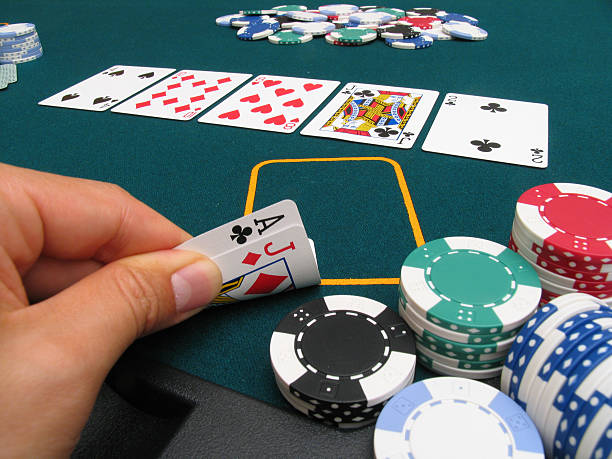
In the high-stakes world of poker, tilt is the silent adversary that can strike at any moment, turning winning sessions into losing ones. It’s the emotional rollercoaster that every player must learn to navigate. Whether you’re a seasoned pro or a novice player, understanding the causes of tilt and the solutions to combat it is essential for success at the poker table. In this comprehensive guide, we’ll delve into the heart of tilt, exploring its various triggers and offering practical solutions to help you stay on course and maintain your edge. From mastering emotional control to developing mental resilience, we’ll cover the critical aspects that can help you keep tilt at bay and consistently perform at your best. So, let’s embark on a journey to tame the tilt, ensuring that it no longer stands between you and poker excellence. Welcome to the world of emotional stability and strategic poker play!
The Psychology Behind Tilt in Poker: Understanding the Causes
Poker is a game of skill, strategy, and luck. It requires players to make calculated decisions based on the cards they are dealt and the actions of their opponents. However, even the most skilled players can fall victim to tilt, a state of emotional frustration that can lead to poor decision-making and ultimately, losses.
Tilt can be caused by a variety of factors, both internal and external. One of the most common causes of tilt is a bad beat, where a player loses a hand despite having a statistically superior hand. This can be frustrating and lead to feelings of anger and disbelief. Another cause of tilt is a string of losses, where a player may feel like they are unable to win no matter what they do. This can lead to feelings of hopelessness and despair.
External factors can also contribute to tilt. For example, a player may be distracted by their surroundings, such as loud music or a crowded room. This can make it difficult to focus on the game and lead to poor decision-making. Additionally, a player may be affected by the behavior of their opponents, such as taunting or trash-talking. This can be especially frustrating if the player feels like they are being unfairly targeted.
Understanding the causes of tilt is important, as it can help players recognize when they are experiencing it and take steps to prevent it from affecting their game. One way to do this is to practice mindfulness, which involves being aware of one’s thoughts and emotions in the present moment. By recognizing when they are feeling frustrated or angry, players can take a step back and refocus their attention on the game.
Another way to prevent tilt is to take breaks when necessary. If a player is feeling overwhelmed or frustrated, it may be helpful to step away from the game for a few minutes to clear their head. This can help them regain their focus and approach the game with a fresh perspective.
Finally, it is important for players to maintain a positive attitude, even in the face of adversity. This can be difficult, especially if a player is experiencing a string of losses or is being targeted by their opponents. However, by maintaining a positive attitude and focusing on the long-term goals of the game, players can avoid falling into a state of emotional frustration and make better decisions.
In conclusion, tilt is a common problem in poker that can be caused by a variety of factors, both internal and external. Understanding the causes of tilt is important, as it can help players recognize when they are experiencing it and take steps to prevent it from affecting their game. By practicing mindfulness, taking breaks when necessary, and maintaining a positive attitude, players can avoid falling into a state of emotional frustration and make better decisions at the poker table.
How to Recognize Tilt in Poker and Prevent It from Affecting Your Game
Poker is a game of skill, strategy, and luck. It requires players to make calculated decisions based on the cards they are dealt and the actions of their opponents. However, even the most skilled players can fall victim to tilt, a state of emotional frustration that can negatively impact their game.
Tilt can be caused by a variety of factors, including bad beats, losing streaks, and personal issues. When a player is on tilt, they may make irrational decisions, play too aggressively, or become overly cautious. This can lead to poor performance and ultimately, losses.
Recognizing tilt is the first step in preventing it from affecting your game. Some common signs of tilt include playing too many hands, making impulsive decisions, and becoming easily frustrated. If you notice these behaviors in yourself, it may be time to take a break and regroup.
One way to prevent tilt is to practice good bankroll management. This means only playing with money that you can afford to lose and setting limits on your losses. By doing so, you can avoid the stress and anxiety that can come with losing large sums of money.
Another way to prevent tilt is to take breaks during your game. This can help you clear your mind and refocus on your strategy. It’s also important to stay hydrated and well-rested, as fatigue and dehydration can contribute to tilt.
If you do find yourself on tilt, there are several strategies you can use to regain your composure. One approach is to take a deep breath and count to ten before making any decisions. This can help you calm down and think more clearly.
Another strategy is to change your focus. Instead of obsessing over your losses, try to focus on the present moment and the cards in front of you. By doing so, you can avoid dwelling on past mistakes and make more rational decisions.
It’s also important to remember that tilt is a natural part of the game. Even the best players experience it from time to time. The key is to recognize it and take steps to prevent it from affecting your game.
In conclusion, tilt is a common problem in poker that can negatively impact a player’s performance. It can be caused by a variety of factors, including bad beats and personal issues. To prevent tilt, it’s important to practice good bankroll management, take breaks during your game, and stay hydrated and well-rested. If you do find yourself on tilt, there are several strategies you can use to regain your composure, including taking deep breaths and changing your focus. By recognizing tilt and taking steps to prevent it, you can improve your game and increase your chances of success.
Strategies for Overcoming Tilt in Poker: Tips and Tricks
Poker is a game of skill, strategy, and luck. It requires a lot of patience, focus, and discipline to succeed. However, even the most experienced players can fall victim to tilt, a state of emotional distress that can lead to poor decision-making and costly mistakes.
Tilt can be caused by a variety of factors, including bad beats, losing streaks, and personal issues. When a player is on tilt, they may become angry, frustrated, or anxious, which can cloud their judgment and impair their ability to make rational decisions.
One of the most common causes of tilt is bad beats. A bad beat occurs when a player has a strong hand but loses to an opponent who catches a lucky card on the river. This can be incredibly frustrating, especially if the player has invested a lot of time and money into the hand.
Another cause of tilt is losing streaks. When a player is on a losing streak, they may start to doubt their abilities and become more risk-averse. This can lead to a cycle of losses, as the player becomes more and more cautious and fails to take advantage of opportunities to win.
Personal issues can also contribute to tilt. If a player is dealing with stress, anxiety, or other emotional issues, they may be more prone to tilt. This can be especially problematic if the player is using poker as a way to escape from their problems, as they may become even more emotionally invested in the game.
So, what can players do to overcome tilt? There are several strategies that can be effective in reducing the impact of tilt and improving decision-making.
One of the most important things that players can do is to recognize when they are on tilt. This can be difficult, as tilt can sometimes be subtle and insidious. However, if a player is feeling angry, frustrated, or anxious, they should take a break from the game and try to calm down.
Another strategy is to focus on the process, rather than the outcome. Instead of worrying about winning or losing, players should focus on making good decisions and playing their best game. This can help to reduce the emotional impact of bad beats and losing streaks, as players will be more focused on the long-term goals of the game.
Players can also try to change their mindset by adopting a more positive attitude. Instead of dwelling on losses or mistakes, players should focus on the opportunities to learn and improve. This can help to reduce the emotional impact of tilt and improve decision-making.
Finally, players can seek support from friends, family, or a therapist. Talking about their experiences and emotions can help players to process their feelings and develop coping strategies for dealing with tilt.
In conclusion, tilt is a common problem in poker that can be caused by a variety of factors. However, by recognizing the signs of tilt and adopting effective strategies for managing it, players can improve their decision-making and reduce the emotional impact of bad beats and losing streaks. With practice and patience, players can overcome tilt and become more successful at the game of poker.
The Role of Mindfulness in Managing Tilt in Poker
Poker is a game of skill, strategy, and luck. It requires players to make calculated decisions based on the cards they are dealt and the actions of their opponents. However, even the most skilled players can fall victim to tilt, a state of emotional frustration that can lead to poor decision-making and ultimately, losses.
Tilt can be caused by a variety of factors, including bad beats, losing streaks, and personal issues. When a player experiences a bad beat, they may feel angry or frustrated that their strong hand was beaten by a weaker one. Losing streaks can also be a trigger for tilt, as players may feel like they are unable to win no matter what they do. Personal issues, such as financial stress or relationship problems, can also contribute to tilt by distracting players from the game and causing them to make impulsive decisions.
The effects of tilt can be devastating for a player’s bankroll. When a player is on tilt, they may make irrational decisions, such as calling bets with weak hands or going all-in with marginal holdings. These decisions can lead to significant losses and can quickly deplete a player’s bankroll.
Fortunately, there are ways to manage tilt and prevent it from affecting your game. One effective strategy is mindfulness, which involves being present in the moment and aware of your thoughts and emotions.
Mindfulness can help players recognize when they are experiencing tilt and take steps to manage it. By being aware of their emotions, players can identify when they are feeling frustrated or angry and take a break from the game to calm down. This can help prevent impulsive decisions and allow players to make more rational choices.
In addition to mindfulness, there are other strategies that players can use to manage tilt. One effective technique is to take a break from the game and engage in a relaxing activity, such as meditation or exercise. This can help players clear their minds and refocus their energy on the game.
Another strategy is to set limits on your play. By setting a time or money limit, players can prevent themselves from becoming too emotionally invested in the game and reduce the risk of tilt.
Finally, it is important for players to maintain a positive attitude and focus on the long-term goals of the game. While losses can be frustrating, it is important to remember that poker is a game of skill and strategy, and that even the best players experience losses from time to time.
In conclusion, tilt is a common problem in poker that can lead to poor decision-making and significant losses. However, by practicing mindfulness and other strategies, players can manage their emotions and prevent tilt from affecting their game. By staying focused, maintaining a positive attitude, and making rational decisions, players can improve their chances of success and enjoy the game of poker to its fullest.
Tilt in Poker: Common Mistakes and How to Avoid Them
Tilt in Poker: Causes and Solutions
Poker is a game of skill, strategy, and luck. It requires players to make calculated decisions based on the cards they are dealt and the actions of their opponents. However, even the most skilled players can fall victim to tilt, a state of emotional frustration that can lead to poor decision-making and ultimately, losses.
Tilt can be caused by a variety of factors, including bad beats, losing streaks, and personal issues. When a player experiences a bad beat, they may become angry or frustrated, leading them to make irrational decisions in an attempt to recoup their losses. Similarly, a losing streak can cause a player to doubt their abilities and become overly cautious or reckless in their play.
Personal issues can also contribute to tilt. A player who is dealing with stress or anxiety outside of the game may bring those emotions to the table, leading to poor decision-making and a lack of focus. Additionally, a player who is under the influence of drugs or alcohol may be more prone to tilt, as their judgment and inhibitions are impaired.
So, what can be done to avoid tilt and improve your chances of winning at the poker table? The first step is to recognize the signs of tilt and take steps to prevent it from taking hold. This may involve taking a break from the game, practicing relaxation techniques, or seeking professional help for personal issues.
Another important factor in avoiding tilt is maintaining a positive mindset. This means focusing on the long-term goals of the game, rather than getting caught up in short-term losses or wins. It also means accepting that luck plays a role in the game and that even the best players will experience bad beats and losing streaks.
In addition to these mental strategies, there are also practical steps that can be taken to avoid tilt. One of the most effective is to set limits on your play. This may involve setting a time limit for each session or a budget for your bankroll. By setting these limits, you can avoid the temptation to chase losses or play beyond your means.
Another practical strategy is to focus on your opponents rather than your own cards. By observing their behavior and making educated guesses about their hands, you can gain an advantage in the game and avoid becoming too emotionally invested in your own cards.
Ultimately, avoiding tilt in poker requires a combination of mental and practical strategies. By recognizing the causes of tilt and taking steps to prevent it, you can improve your chances of winning at the poker table and enjoy the game to its fullest. So, the next time you find yourself feeling frustrated or angry at the table, take a deep breath, refocus your attention, and remember that poker is a game of skill, strategy, and luck.
 Skip to content
Skip to content





